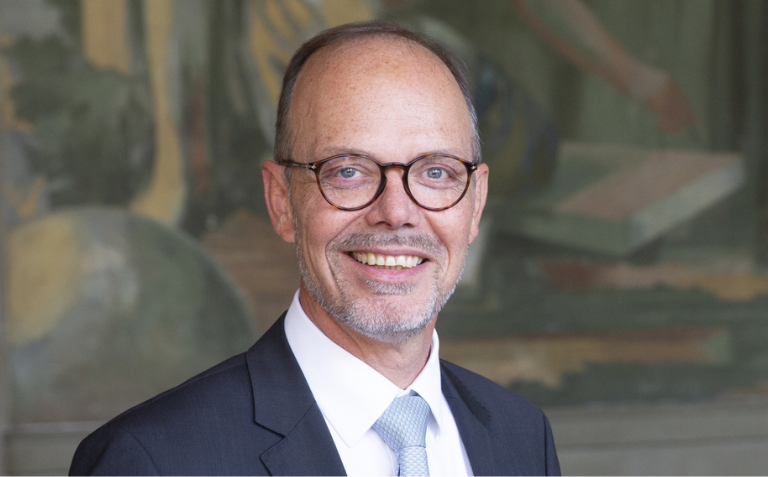
“Bringing meaning back to the healthcare professionals”
Share this article
Appointed Dean of the Faculty of Medicine at the University of Geneva, Professor Antoine Geissbuhler, is also Director of Teaching and Research at the HUG, and BioAlps President. In an interview to Pulsation Magazine, he has set himself the ambitious goal of meeting the many challenges facing medical education today.
What would you like to inject into the Faculty of Medicine at the University of Geneva over the next four years?
Prof. Antoine Geissbuhler: I’m not here to start a revolution. But there are a number of ambitions that I’d like to bring to fruition. Firstly, to make the faculty an inclusive place for participatory debate. The aim is to strengthen medical students’ sense of belonging and commitment, particularly in the face of today’s major challenges such as the sustainability of the healthcare system, digitalisation and data management. I also think it’s important to work on the issues of good treatment, equality and diversity in the way the faculty lives together. Finally, one of today’s major challenges is to give meaning back to the healthcare professions. In a changing world, the question is how to re-enchant these professions, despite the many demographic, financial and administrative constraints. But also, in an increasingly competitive era, how can we train and retain scientific talent to maintain our ranking among the world’s top universities?
Are medical students aware of these major challenges?
In any case, they are aware of the challenges associated with medical practice, the changing nature of the profession and the fact that it is under pressure, particularly with the “needs clause” limiting access to practice. The profession is seen less and less as a vocation. What’s more, it’s no longer all that attractive. We need to work with the health authorities to make this wonderful profession attractive again, by ensuring that those who are trained find an enviable and responsible place in society.
In practical terms, what can be done to make the profession more attractive?
There are several avenues, not least the upgrading of primary care medicine. In Switzerland, we have a shortage of primary care doctors (GPs, general internal medicine doctors, paediatricians, etc.), who are capable of providing comprehensive, long-term care for patients. We only have 20% of them, whereas we need more than twice that number for an efficient healthcare system. We also need to develop the skills of modern management and interprofessional working.
You are also Director of Teaching and Research at the HUG. What are your development plans for this sector?
We’ve come to the conclusion that clinical research in Switzerland, despite the resources at its disposal, is not at the level it could be. In the era of precision medicine, we need to pool our efforts on a national and even international scale. We need to change the way we think and the tools we use. We also need to bring together basic research, which is carried out at university, and clinical research, which is carried out at the HUG. The transition from one to the other will enable us to develop new areas of study and facilitate their transposition into patient care.
Artificial intelligence is currently a major issue in research, education and care. What questions does it raise?
Artificial intelligence is a common challenge for both universities and hospitals. It is reshuffling the deck in teaching, both in the way we learn and in the way we practise. Artificial intelligence has been used in healthcare for nearly fifty years, in particular to help diagnose and choose treatments. It can now be used for less rewarding tasks such as documentation and document generation, which are certainly necessary, but which take up an enormous amount of doctors’ time, to the detriment of time spent with patients. We need to reverse this trend and use artificial intelligence to free carers from these administrative tasks, thereby strengthening the human dimension of medical practice. Properly designed, these tools will also enable patients to play a more active role in their care.
Text : Clémentine Fitaire
Source: Pulsation